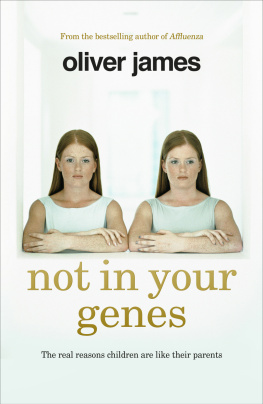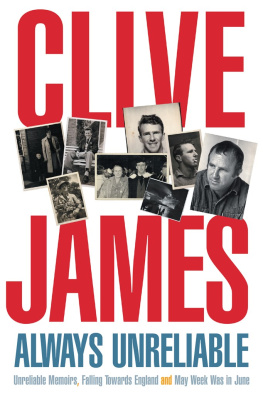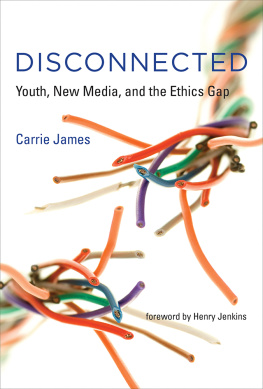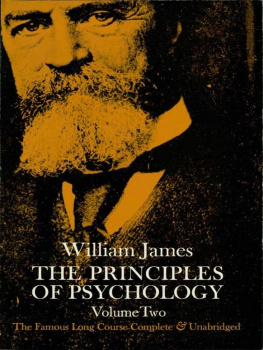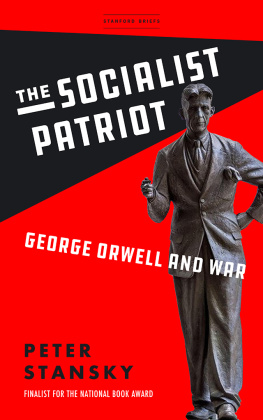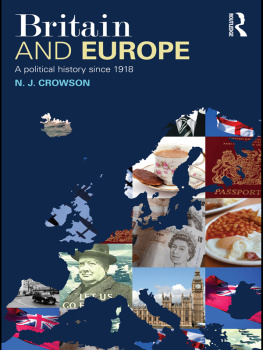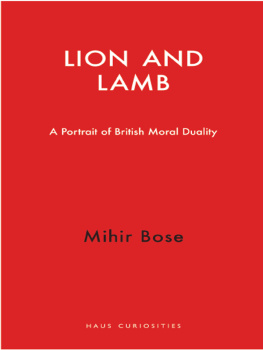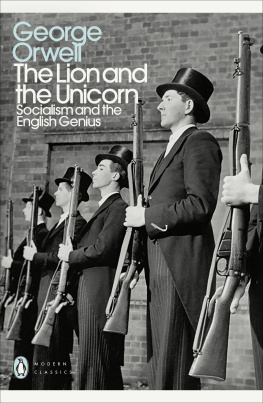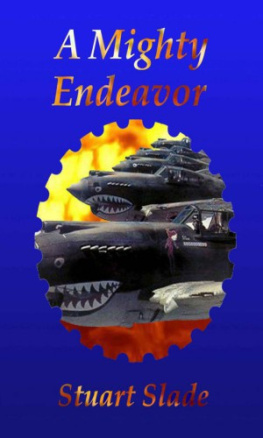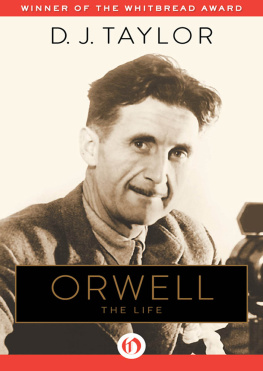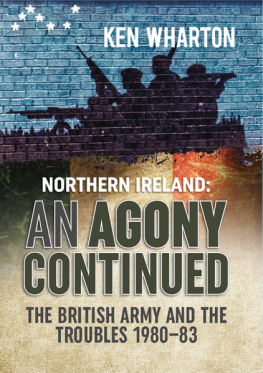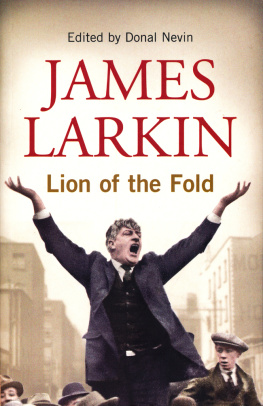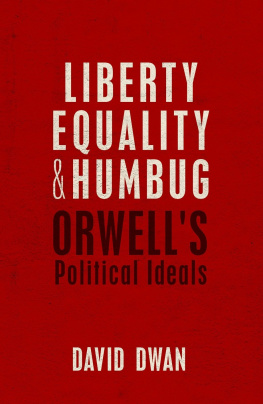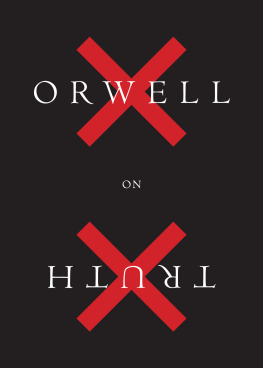Title Page
ORWELLS FADED LION
The Moral Atmosphere of Britain
19452015
Anthony James
Publisher Information
Published in the UK by
Imprint Academic, PO Box 200
Exeter EX5 5YX, UK
Digital edition converted and distributed in 2015 by
Andrews UK Limited
www.andrewsuk.com
Copyright 2015 Anthony James
The moral rights of the author have been asserted.
All rights reserved. No part of this publication may be reproduced, stored in a retrieval system, or transmitted, in any form or by any means without the prior written permission of the publisher, nor be otherwise circulated in any form of binding or cover other than that in which it is published and without a similar condition being imposed on the subsequent purchaser. Any person who does so may be liable to criminal prosecution and civil claims for damages.
Dedication
To Emma Anne and the future
and
to the memory of Pamela, 19442014
Quotes
The yes-man is your enemy, but your friend will argue with you.
- Russian Proverb
Certainly then that people must needs be mad or strangely infatuated, that build the chief hope of their common happiness or safety on a single person; who, if he happen to be good, can do no more than another man; if to be bad, hath in his hands to do more evil without check, than millions of other men. The happiness of a nation must needs be firmest and certainest in full and free council of their own electing, where no single person, but reason only, sways .
-John Milton
Chapter One
Who Controls the Past Controls the Future
Tolstoy began his novel Anna Karenina with the famous line: All happy families resemble one another, but each unhappy family is unhappy in its own way. Perhaps we can usefully paraphrase Tolstoys statement: all humane societies resemble one another, but each inhumane and unjust society is inhumane and unjust in its own way.
When the Daily Mail attacked the father of the leader of the Labour Party in autumn 2013, the paper also had something to say about the historian Eric Hobsbawm. The father of the Labour leader had been called the man who hated Britain by the Daily Mail , which then added a postscript on Hobsbawms refusal to condemn Stalinisms 30 million dead or the brutal Soviet invasion of Hungary in 1956. These statements about Hobsbawm are lies. Hobsbawm calls the millions of deaths under Stalin shameful and beyond palliation, let alone justification, as well as reprinting a collective letter of protest against the Soviet invasion, co-signed by himself, in his autobiography.
Not surprisingly, the Labour leader dismissed the accusation made against his father as false, and yet hatred is difficult to prove or measure, whereas anyone can open Hobsbawms enduringly popular books and see the proof of this newspapers dishonesty in black and white. Sadly, it is safe to assume that very, very few of the Daily Mails readers ever did so. The paper also told its readers that Marxism supplied the philosophical underpinning of Stalinism (presumably just as the teachings of Jesus supplied the philosophical underpinning for the burning of heretics and witches by the Christian Church), although those who wrote this did not show the least sign that they had even a faint understanding of either Marxism or Stalinism.
Perhaps we could also consider the following before we move on. There are two photographs (Agence France Presse) of Saddam Hussein, then friend and ally of the West, visiting southern France in September 1975 in order to buy weapons. There is another photograph (Getty Images) of his body, just after he was hastily judicially murdered, published on 31 December 2006. It is difficult not to think of one of the most celebrated passages from Orwells Nineteen Eighty-Four in connection with these photographs: ...at just this moment it had been announced that Oceania was not after all at war with Eurasia. Oceania was at war with Eastasia. Eurasia was an ally. Of course, we do not yet live in a world governed by a ruling elite motivated by the lust for pure power, such as the one in Orwells novel. America and Britain supplied Saddam with the chemical weapons and intelligence used to carry out some of his worst war crimes and atrocities. This was done out of a monumental greed for profit; and any lie - however cynical or fantastic - can and will be used to conceal that motivation.
British and Western governments rarely ban books or simply destroy information and then go forward with the conviction that such information has never existed (which was the method of the Party in Orwells novel). And yet these governments understand very well the Partys slogan in Nineteen Eighty-Four : Who controls the past controls the future: who controls the present controls the past. The dishonest speeches of politicians seem to be greeted increasingly with healthy scepticism and cynicism by ordinary people. However, alongside such utterances there is the much more potent and seductive stream of superficiality and bigotry served up by the popular press. The abundance of information available today has to some extent made all of us indifferent and numb. There is something unreal about Lasers in the jungle somewhere / Staccato signals of constant information / A loose affiliation of millionaires and billionaires as Paul Simon called them in his 1986 song The Boy in the Bubble . The popular press prods very effectively on the nerves of fear and resentment in communities saturated with information and weary of facts and more facts. We shall return to the activities of the tabloid press and to war in the Middle East further on. However, we need to contemplate the road Britain has travelled since Orwell wrote so perceptively about this country, spelling out his hopes for change in The Lion and the Unicorn as the Nazi bombs fell. The examples of news and information given above are sadly relevant to the history of the last seventy years.
A Labour government was elected with a large majority in July 1945 with Clement Attlee as Prime Minister, proceeding to create the National Health Service and nationalize the coal, electricity, gas and steel industries as well as transport; this was rather far from the left-wing, non-communist revolution that Orwell had in mind. Nationalization in itself was not enough, indeed meant very little, without a change in culture, as Orwell knew only too well. The culture of equality and the culture of democracy need to be developed in a revolution that is a process and not a single event - something that was impossible to create in besieged, starving, backward Soviet Russia after 1917 and something not really attempted in Britain after 1945.
The British class system and social structure were left largely untouched after the war, and elements of them remain surprisingly resilient and tenacious today. Nevertheless, as the television journalist and 1960s icon Joan Bakewell described in her autobiography The Centre of the Bed (2003), the early years of the new Labour government were generally a time of optimism and idealism. It was not to last. The general election of May 1950 cut the large Labour majority to five. The war had created the momentum for the electoral landslide of 1945, but its aftermath spread disillusionment with Labour as people reacted against continuing austerity. The Conservatives led by Churchill returned to office, the Labour Party being subsequently defeated in the general elections of 1951, 1955 and 1959. The Cold War began in 1947, although this was to a large extent a corner into which Truman (and, to a lesser extent, Churchill in his 1946 Iron Curtain speech) had backed Stalin, as a realistic consideration of events reveals.
The reappraisal of Stalin as a leader by the widely respected historian Geoffrey Roberts is more generous to the Soviet dictator than the account by Hobsbawm, a member of the Communist Party for fifty years. In any case, the Cold War could only make people more conservative and defensive and make the Conservatives more popular, as - in part at least - it was designed to do. The crisis over the Falkland Islands in 1982 and the war against a distant and much weaker enemy had something of the same effect thirty-five years later. Still, the acceptance of the need for full employment and a welfare state by all the major political parties did endure until the mid-1970s when the post-war consensus was torn up by Margaret Thatcher and the alliance of social and political forces that she represented. The consensus was helped by the period of prosperity that was already underway when Anthony Eden became Prime Minister in 1955.
Next page

